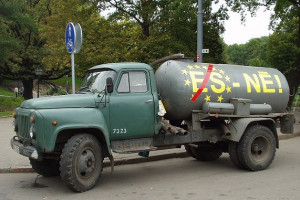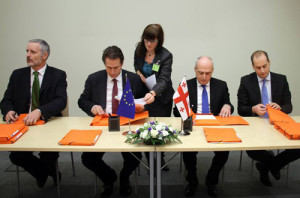
Some consequences we have already seen. Ukraine had been expected to sign a similar DCFTA to Georgia, and the countries have been treated as a common package by the EU and NATO for many years: expected to integrate with them at the same pace, sign the same agreements at the same time and eventually join both blocs together. But in Ukraine the EU overplayed its hand by highlighting the hidden-agenda behind these agreements, and Ukraine and the region are paying the price.
Free trade, by definition, has no borders as well as no tariffs. When the EU produced a report saying that Georgia was ready for the DCFTA its representatives in Tbilisi announced at the launch that free trade was natural, and implied that tariffs were some sort of crypto-communist deviation. Therefore free trade should mean that you conduct trade with whoever you like, whenever you like, without restriction.
Ukraine’s government made the mistake of taking the EU at its word. Rather than restrict itself to free trade relations with EU countries it wanted to extend the principle further and enjoy free trade with Customs Union countries as well.
In theory, the free trade-loving EU should not have objected to this, as it would simply mean extending the application of what the EU thinks is good practice. Instead it demanded that trade should only be free when the EU said so. Choose between us and Russia, Ukraine was told. Russia is the other side and you cannot trade freely with them.
This action indicated that a DCFTA is actually a political agreement to join one side or another, not an agreement concerning trade. Ukraine refused to make a choice, seeking to develop its economy by developing advantageous relations with all partners, not just one, and treating foreign policy as a separate issue. Now we see the consequences on our TV screens every day, although every fully-fledged EU member has, of course, some sort of trade relations with Russia.
Georgia has had enough conflict on its territory since independence, all of it stirred by foreign powers choosing their own side to pursue their own agendas. Does it want more? Is that an acceptable price to pay for EU integration?
The Case of Georgia
Negotiations on the DCFTA between the EU and Georgia officially began in February 2012. The document was held by both sides to be a precursor to Georgia signing an Association Agreement, which will harmonise many local laws, such as those on visa rules and energy policy, with those of the EU.
Georgia claims it wants to export its products and be a player in the world market, and has now taken the first steps towards this by initialling the Association Agreement on November 19, 2013. No one is under any illusion, however, that the fact that Georgia has contributed more troops per capita than any other country to recent US-led military operations in Afghanistan, Iraq etcetera, was one of the factors which encouraged the EU to offer and then deliver this agreement.
But what does the DCFTA actually offer in economic terms? Farmers and food processors know only too well what the consequences of Georgia joining the World Trade Organisation, WTO, have been. A former food exporting country is now dependent on cheap foreign imports to feed itself.
Questions of work ethic and economies of scale are also not being addressed by those promoting the DCFTA. Can such a small country compete in unrestricted export markets when it cannot produce globally significant quantities of anything? The problem is that may never adopt to a 9 to 5 work culture that like most the rest of the world works to?
The terms of the DCFTA will make Georgia’s trade balance worse in the short term. Foreign goods produced by well-known foreign companies are more welcome in Georgia than Georgian goods, produced by companies no one else has heard of, will be in the EU. It will gain Georgian companies access to a potentially lucrative market but not the means of competing in it successfully. They will have to spend money they don’t have, and years of effort, adjusting to the demands of the European market.
Entering the EU market will only work to Georgia’s benefit if there is a shared commitment. Every individual EU country will have to want what Georgia wants, to the same degree and with a uniform level of enthusiasm, for Georgian products to make any significant impact in Europe and restore the trade balance.
What Benefits?

The regulatory frameworks the expected in Europe, such as HACCP and other sanitary conditions, are practically non-existent in Georgia. The Center for Disease Control, CDC, in Atlanta, ranks Georgia as the country having the highest incidence of food-borne diseases, and in fast food outlets you cannot be sure if you are eating horse, beef or donkey, despite the long lines at McDonalds and other fast food outlets. It was recently confirmed that donkey meat had entered the food chain in Georgia, and several persons ended up in hospital.
Georgian companies brag about achieving any ISO standard. This is not because this demonstrates that they do good work but because it shows they are rich enough to afford the accreditation process. Setting up a food safety structure is too expensive for the country, and enforcing it even more so. Furthermore Georgian producers are not going to be told they have been doing things wrong for several generations, no matter how much money and training you offer them to do things differently.
It is already cheaper to import goods into Georgia than produce them locally. Imposing regulations which don’t yet exist will only make this situation worse, whilst not bestowing enough benefits to compensate even in the long term. The number of discontented Georgian businessmen will grow, as will budget deficits, and thus economic growth and the public good will not be achieved. While the dream of Europe still exists, the gap between dream and reality will seem ever more acute.
A number of current EU countries have been asking for many years – if this is really about economic benefits, where are they? If there are political benefits which are more important, where are those?
The radical rise in support for anti-EU political parties in each EU member state, even when this stance is coupled with disturbing positions on race or foreign relations, demonstrates how consistently these questions are being asked, even in countries which still agree with the concept of the European Union. Will they not be asked even more in a country like Georgia, which still sees Europe as a faraway place it wants to call home, rather than the only place it can be?
The Ukraine Example
Ukraine negotiated an Association Agreement with the EU which contained most of what the country wanted. However it omitted one vital factor. It would have reduced tariffs but not guaranteed visa-free travel or given Ukrainians the right to work in Europe. For Georgians, like Ukrainians, these are fundamental issues.
Free trade also means the right of individuals to freely sell their labour, which they cannot if they are restricted to local markets. The reason Georgians and Ukrainians want to join the EU is to gain this right, not be deluged by a flood of imported goods they would buy for themselves in the West – where they would have the money to do so.
The protests about Ukraine refusing to sign the offered EU Association Agreement when it had been offered a better deal by Russia, which have now turned deadly, were part of protests over much bigger issues. Yanukovych was accused of depriving people of their rights by restricting their freedom.
Now the Georgian government has signed the DCFTA, which still does not give ordinary Georgians the benefits they want from Europe, how long will it be before it faces the same accusations? In a country which has already seen three revolutions in twenty years?
The EU was actually founded to achieve a political end – to make further European war impossible by integrating economies. Any economic benefits were merely a by-product. It is still a political bloc, but now pretends to be motivated to expand not by politics but inexorable economic logic.
If it told the truth, we would not have this problem. But countries like Georgia, forced to repeat the lie that joining is about gaining economic benefits, can now see on their doorstep where this will get them.
Henry Kamens, columnist, expert on Central Asia and Caucasus, exclusively for the online magazine “New Eastern Outlook”.
